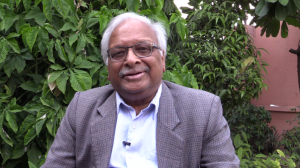The first Jan Sahitya Parv (People’s Literature Festival), organised by the Saajha Sanskritik Morcha, a joint cultural forum backed by Communist Party of India Marxist (CPI-M), Communist Party of India Marxist-Leninist (CPI-ML), and various other people’s organisations, took place in Jaipur on 24 and 25 January, 2018.
The festival kicked off with a mashaal-juloos, a torch rally, on 23rd evening — the eve of the fest. Although the turnout at the rally was slightly disappointing, what was heartening was that all those present were equally convinced about the need for, and the importance of, such an event. Their conviction was evident in their voices, which rang out in the street leading from the Rajasthan University Hostel Gates to the Dera Shri Shikshak Sadan, Rajasthan University, where the rally culminated.

The Jan Sahitya Parv was organised with the aim of opening a dialogue on literature — is literature political; what kind of literature is needed; what kind of literature is being produced and consumed; and who is it for?
According to the organisers, literature should be for the people and by the people. As would become clear in the six sessions that took place over the course of the next two days, there was a general consensus among the festival attendees, the speakers, and the organisers — that literature is political, and, therefore, literature should be used to give a voice to the people, to the marginalised, to the deprived. More importantly, literature can become, and should be allowed to become, a space for registering political dissent, for resistance.
The festival, therefore, chose to focus on literature, writers, and activists who do this. For instance, in the book market at the festival, there were books with revolutionary songs, there were posters of Simone de Beauvoir, and there were republished writings of Bhagat Singh.
Apart from the overt political stand of the event, which sought to remove the imagined difference between “culture” and “politics,” there was another thing that set this literature festival apart. The festival was entirely crowd funded. The organisers had deliberately not taken money from any funding organisations or corporations.

Rajeev Gupta, a professor of sociology in Rajasthan University, and a key member of the organising committee, poignantly explained, “People’s literature should be like an open sky; all kinds of birds should be allowed to fly, to scale the skies, without any restrictions, with complete freedom.”





